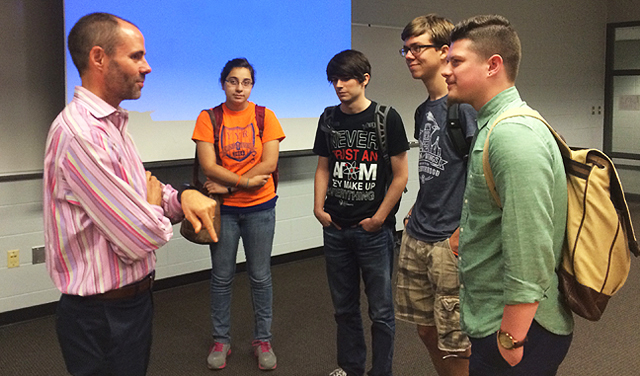Oklahoma Christian University’s computer science program partnered with NextThought to equip students for the professional field.
“We have been working through and redesigning the computer science undergraduate curriculum,” Associate Professor of Computer Science David North said. “Last fall, we offered Software Engineering I, which is an introduction to software engineering.”
The course was a hybrid course, a combination of online and in-class assignments.
“It allowed us to do some different things in class and present additional material online,” North said. “So to help us do that, we used a tool called NextThought. It allowed us to deliver a course that had quizzes, audio, video and reading materials. Students had stuff to do before class, during class and after class.”
Students completed several assignments to help them understand computer science.
“This course gives a broad exposure to computer science and software engineering so they understand the major that they are getting into,” North said. “Students also get an overview of the software engineering practices that they will be using not only in their college career but also in their professional career.”
Students were able to answer questions, build flashcards and complete activities about the material that they were learning.
“It allows you to have different ways of learning,” junior Jonathan Troyer said. “It is really repetitive and it helps with memory retention.”
Thirty alumni participated in weekly discussions to give students insight about working in the field of computer science.
“It was really cool being able to meet with actual computer science professionals,” Troyer said. “Being able to talk about the field and see how they used the stuff we are learning about was really powerful.”
According to Oklahoma Christian’s website, students had about 150 assignments, 80 short videos to view and 50 articles to read outside of class.
“A cool benefit was the videos and articles Professor North included on NextThought,” sophomore Andrew Vines said. “The articles gave us detailed looks at what we were learning from different perspectives and the videos helped solidify the information from class. The videos ranged from pure information to hilarious skits to interviews with companies who were using exactly what we were learning.”
Troyer said he enjoyed the class and hopes for more integration with NextThought in classes in the future.
“The more tailored it can be, the better people will be able to learn,” Troyer said. “People will be able to take these skills and put them in the real world.”
Some students said they liked the NextThought program and found it more helpful than Blackboard, the current online program Oklahoma Christian uses for courses.
“The one thing I liked most about this course was how everything was in one, single place and that the place was not Blackboard,” Vines said. “NextThought was actually enjoyable to use, which made me motivated to get more done. I hope one day that Blackboard will be replaced by a better, more user-friendly, online service. NextThought may be just that.”
Vines said he liked the integration that NextThought offers and hopes more courses will be available through this program.
“I truly hope more classes follow suit and start to use this idea in their courses,” Vines said. “There is a range of possibilities that NextThought can give to professors, and not only that, it will benefit the students as well. It is time we blur the line between online and in-class learning.”












Be First to Comment